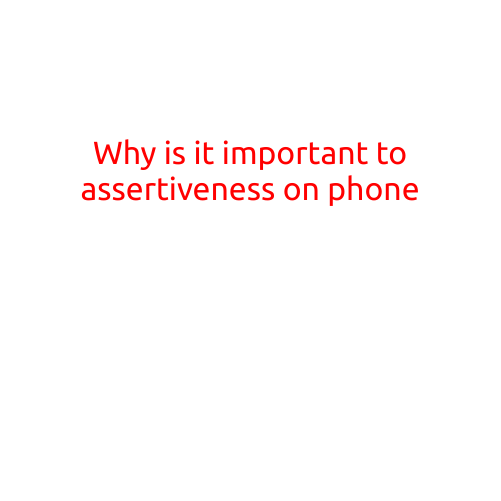
Why is it Important to Practice Assertiveness on the Phone?
In today’s digital age, the phone has become an essential tool for communication, and it’s common to find ourselves engaging in conversations over the phone for both personal and professional purposes. While phone calls can be convenient, they also present a unique set of challenges when it comes to communication. One of the most crucial skills to master in phone conversations is assertiveness.
What is Assertiveness?
Assertiveness is the ability to express your thoughts, feelings, and needs in a clear and respectful manner while also being open to the perspectives of others. In the context of phone conversations, assertiveness means being able to convey your message without being aggressive, submissive, or passive.
Why is Assertiveness Important on the Phone?
Practicing assertiveness on the phone can have a significant impact on the success of your conversations. Here are some reasons why assertiveness is important when talking on the phone:
- Clear Communication: Assertive phone calls ensure that your message is conveyed clearly and effectively. You are able to express your thoughts and feelings without ambiguity, which reduces the risk of misunderstandings and miscommunications.
- Respectful Boundary Setting: Assertiveness helps you set clear boundaries and expectations in phone conversations. This is particularly important when negotiating, selling, or advocating for your needs. By being clear and direct, you can avoid misunderstandings and ensure that your needs are respected.
- Confidence Boost: Assertive phone calls can give you a confidence boost, especially in situations where you may feel nervous or anxious. When you’re able to express yourself clearly and confidently, you’re more likely to feel empowered and in control.
- Better Relations: Assertiveness can improve relationships, whether personal or professional. By being open, respectful, and direct, you can build trust and strengthen your connections with others.
- Reducing Conflict: Assertiveness can help reduce conflict and misunderstandings in phone conversations. By being clear and direct, you can avoid misunderstandings and resolve issues more quickly and efficiently.
Tips for Practicing Assertiveness on the Phone
To practice assertiveness on the phone, follow these tips:
- Prepare: Before making a call, take a few moments to gather your thoughts and prepare what you want to say.
- Listen Actively: Listen carefully to the other person and respond thoughtfully.
- Be Clear and Direct: Avoid beating around the bush or using vague language. Clearly and directly express your thoughts and feelings.
- Use a Respectful Tone: Speak in a respectful tone and avoid raising your voice or being aggressive.
- Stay Calm: Practice deep breathing and try to stay calm, even in challenging conversations.
Conclusion
Assertiveness is a valuable skill to master, and it’s especially important when talking on the phone. By practicing assertiveness, you can improve communication, build stronger relationships, and achieve greater success in your personal and professional life. Remember to be clear, direct, respectful, and calm in your phone conversations, and you’ll be well on your way to becoming a more confident and effective communicator.





